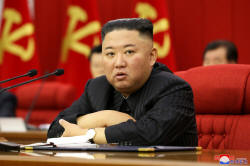North Korea's currency, commodity markets in turmoil as borders stay
closed - reports
 Send a link to a friend
Send a link to a friend
 [June 23, 2021] By
Josh Smith [June 23, 2021] By
Josh Smith
SEOUL (Reuters) - Currency exchange rates
and commodity prices appear to be wildly fluctuating in North Korea as a
resumption in major trade with China hasn't materialised, media reports
and analysts say, increasing the hardship for residents facing food
shortages.
After steadily rebounding in the first few months of the year, China's
exports to North Korea in May fell to $2.71 million from $28.75 million
in April, quashing hopes among traders along the border that more than a
year of anti-coronavirus closures could soon ease.
North Korea is highly insular and it is difficult to pinpoint the
situation within the country. But reports this week that China, its
biggest ally, plans to keep pandemic border restrictions in place for at
least another year have cast doubt on North Korea's prospects.
In some areas, that appears to be among the factors that sparked
significant volatility in foreign exchange rates and the prices of some
key goods.

"The fuel and forex price swings are likely caused by the foreign trade
situation," said Peter Ward, an expert on North Korea's economy.
Daily NK, a Seoul-based website that has tracked such indicators in
North Korea for years, reported on Tuesday that North Korea’s won had
surged 15-20% against the U.S. dollar and China's renminbi in the space
of around a week.
The swings seem driven in part by North Korean organizations and
individuals selling off their dollars and yuan because the expected
restart of China-North Korea trade did not materialize, the website
reported, citing sources in the country.
“After years of relative stability, the wild swings in prices and
internal exchange rates in recent days threaten to raise the level of
popular desperation and may make reopening trade with China more
difficult,” a report from the U.S.-based 38 North programme, which
tracks North Korea, said this week.
[to top of second column] |

North Korean leader Kim Jong Un speaks at a meeting of the Workers'
Party of Korea in Pyongyang, North Korea in this image released June
18, 2021 by the country's Korean Central News Agency. KCNA via
REUTERS/File Photo

Last week, North Korean leader Kim Jong Un said the country's economy improved
this year but called for measures to tackle the "tense" food situation caused by
the coronavirus pandemic and last year's typhoons.
State media reported that the government would produce and distribute more grain
to the people.
Daily NK reported that corn and rice prices in some of the country’s major
cities, including Pyongyang, have fallen after local residents received
government rations. But some other areas have seen prices soar for basic
supplies, the website said.
Earlier this year, some imported luxuries reappeared on store shelves in
Pyongyang as border restrictions appeared to ease, but prices have shot back up
again, one Western source with contacts in the city told Reuters.
Some shampoo has been selling for U.S. $200 per bottle and a kilogram of bananas
for $45, NK News, which monitors North Korea, reported last week.
"From what we can learn through Asia Press and Daily NK, the food situation
outside a few major cities is very bad," Ward said. "If these trends continue,
we will have to start to worry about hunger and even starvation amongst North
Korea's poorest."
(Reporting by Josh Smith; Additional reporting by Sangmi Cha; Editing by Raju
Gopalakrishnan)
[© 2021 Thomson Reuters. All rights
reserved.] Copyright 2021 Reuters. All rights reserved. This material may not be published,
broadcast, rewritten or redistributed.
Thompson Reuters is solely responsible for this content.
 |